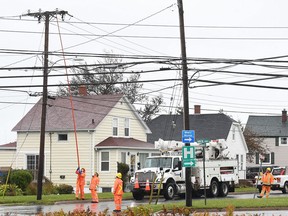Author of the article:
Canadian Press
Michael MacDonald

HALIFAX — The premier of Nova Scotia has issued a stinging rebuke to the telecommunications companies that serve the province, saying too many residents are still without cellphone service four days after post-tropical storm Fiona roared across Atlantic Canada.
Tim Houston issued a statement Wednesday saying it’s unacceptable that there are Nova Scotians who still can’t call 911 or connect with loved ones.
From our newsroom to your inbox at noon, the latest headlines, stories, opinion and photos from the Toronto Sun.
Thanks for signing up!
A welcome email is on its way. If you don't see it, please check your junk folder.
The next issue of Your Midday Sun will soon be in your inbox.
“Nova Scotians have questions about when their service will be restored, how widespread the outages are and what the companies plan to do to ensure this never happens again,” he said. “There is no question we need our telecommunications companies to step up and be more transparent.”
The premier said the government had asked Bell Aliant, Eastlink, Rogers and Telus to send representatives to the province’s emergency co-ordination centre before Fiona’s arrival, but he said none of the companies was initially willing to co-operate.
“Eastlink, Rogers and Telus declined to attend the (co-ordination centre) in person during the initial response,” the premier said.
Bell Aliant, however, eventually sent someone after the province complained to the company’s senior management, but the premier said the representative left after two days to work virtually.
The company issued a statement saying its representative had to move off site Sunday because they had to make their own property safe, but Bell Aliant said they remained connected to the centre. “Both 911 and our emergency responder network also remained fully functional throughout the storm and aftermath,” spokeswoman Katie Hatfield said.
“We have also had a representative take part in every (Emergency Management Office) media availability and are committed to keeping customers updated through the media, our social media channels, websites, call centres and stores.”
At the height of the storm the majority of Bell Aliant’s wireless and wireline networks were operational and “at this point are close to being back to 100 per cent,” Hatfield said.
Meanwhile, Houston said he has asked federal Industry Minister Francois-Philippe Champagne to hold the telecommunications companies accountable for providing information about service outages.
“Other service providers have come together in an effort to make sure Nova Scotians have the information they need, yet the telecommunications companies are consistently missing from the table,” Houston said.
“We are calling on the federal government, as the regulator, to ensure that telecommunications are accountable for their performance in emergencies and transparent with customers.”
As of Wednesday morning, more than 104,000 homes and businesses in Nova Scotia were still without electricity, which represents 20 per cent of Nova Scotia Power’s customers. The outages, which started early Saturday, have had an impact on cellphone service because the backup batteries in cellphone towers are dying.
Poor cellphone service has also been reported in P.E.I. and southwestern Newfoundland, areas thrashed by Fiona with massive storm surges and hurricane-force winds.
Prime Minister Justin Trudeau was scheduled to meet residents of Port aux Basques, N.L., where Fiona destroyed about 100 homes, dragging some of them out to sea amid a record-breaking storm surge.
In nearby Burnt Islands, N.L., which was also hammered by the storm, there was no cellphone service until Wednesday.
On Wednesday, Newfoundland and Labrador Premier Andrew Furey acknowledged there wasn’t internet and phone service in some communities. And the area’s provincial legislator, Andrew Parsons, confirmed there was no service in the remote community of La Poile, which is along the province’s south coast and accessible only by ferry.
When Trudeau was asked about shoddy cellphone service on Monday, he said the federal government had worked with providers before Fiona hit, but added that the storm exceeded even the direst predictions. He said the government learned lessons after post-tropical storm Dorian caused widespread cellphone and power outages across the Maritimes in 2019.
“There will be more to learn on how we keep people protected, given that extreme weather events are going to get, unfortunately, more likely in the coming years,” Trudeau told reporters.
— With files from Holly McKenzie-Sutter in Port aux Basques, N.L.


